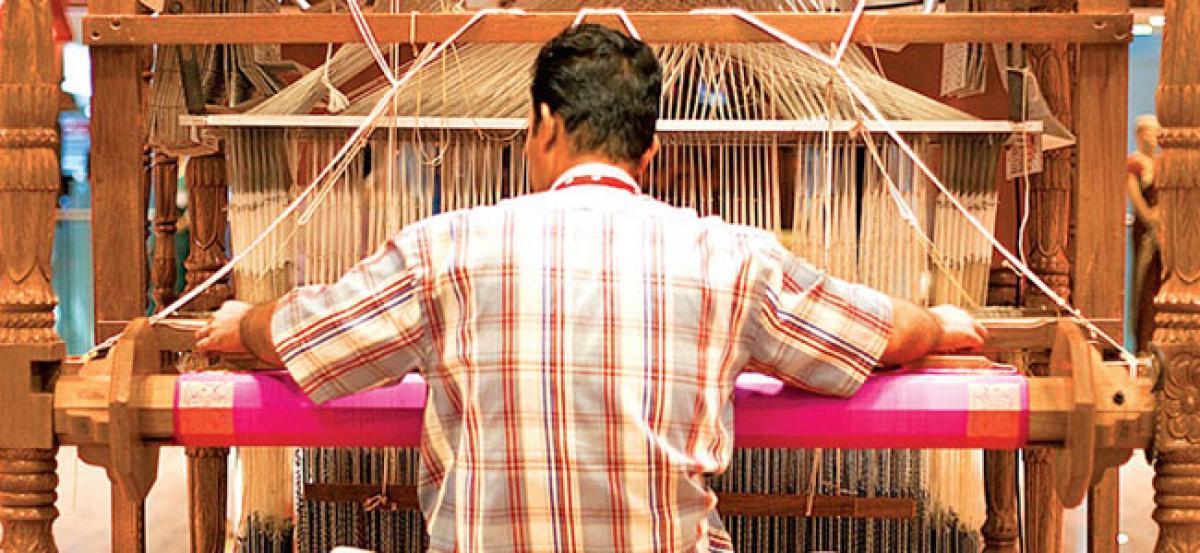Live
- 11 lakh BPL cards revoked, claims K’taka BJP
- Exit polls results indicated victory of the NDA government in Maharashtra and Jharkhand!
- Deputy CM Bhatti Vikramarka Reviews SC/ST Development Funds Implementation
- AP cabinet approves key decisions, check here
- Maharashtra records 58.22 pc turnout, Independent candidate dies of heart attack in Beed
- Manipur: Mobile internet suspension extended for 3 days in 7 districts, curfew relaxed in 4 districts
- EPFO adds 18.8 lakh members in September as employment rises
- ‘Criticise me, not Rabindranath Tagore’, says Assam CM on renaming Karimganj
- Bihar govt launches Ayushman Vandan Scheme
- Infighting again erupts in Trinamool on chair of West Bengal Medical Council
Just In

Handloom products are likely to cost more under GST as the new tax regime results in multiple tax points at several stages of fabric manufacturing and sales, according to representatives from the Telangana handloom and powerloom industry.
Hyderabad: Handloom products are likely to cost more under GST as the new tax regime results in multiple tax points at several stages of fabric manufacturing and sales, according to representatives from the Telangana handloom and powerloom industry. GST turns out to be a major jolt to the handloom and powerloom sectors, which run on thin margins or mostly with losses, they said.
At present, handloom products manufactured by weavers are exempted from tax. Now, tax on cotton yarn, man-made yarn, dying chemicals, manufacturing and sales will attract a higher rate and will impact handloom and powerloom sectors in negative way, according to Adepu Ravindar, honourary president of Sircilla Dyes & Chemicals Merchants’ Association and former chairperson of Sircilla Municipal Corporation.
Speaking to The Hans India, Ravindar said: “So far, there was no tax on handloom products. Earlier, the Centre wanted to impose excise duty, but we at all-India level raised voice against it and subsequently, the government withdrew it. Now, GST coming into force and it’ll impact over 35,000 powerlooms in Sircilla and handloom sector.
We demand for single tax or no tax on handlooms and powerlooms sectors.” A section of the industry believes differential rates for cotton and synthetic fibre under the new indirect tax regime will lead to interpretational issues. The Goods and Services Tax (GST) Council on Saturday announced that five per cent rate on cotton fibre, yarn and fabric, which attract zero duty at present.
Handloom and power loom products are exempted from Central Excise and state VAT. How can the government impose GST on them, questions Ammanabolu Prakash, president of the Telangana Federation of Textiles Associations, which represents 119 associations across the state.
“New tax regime is unfortunate for the textile sector and moreover, traders are also not prepared for GST adoption. Coming under the influence of major players in the textile industry, the government imposed GST on small textile traders and handloom sector.
Right from yarn to manufacturer, wholesaler and retailer, there would GST on three to four stages. After agriculture, the second largest employment provider is textile industry and it’s an unorganised sector. We demand exemption of GST for the textile sector.
For instance, there’re over 100 textiles shops in Siddipet and you can’t find one computer there. How can the government impose online GST regime on them,” says Prakash. The textiles industry says that differential treatment for cotton, silk and synthetic fibre on GST rate is an opportunity lost for a uniform rate for the textile sector. Silk and jute yarns have been exempted, but cotton and natural fibres and all other yarns will be levied a 5 per cent GST.
Manmade fibres will, however, attract 18 per cent rate. “But, silk yarn, making of silk saree and sales may attract tax. Apparels with prices over Rs 1,000 will attract 12 per cent and 5 per cent on those below Rs1,000. We need clarity on this. However, man-made or synthetic fibre yarn will attract 18 per cent GST. This is also very high,” adds Ravindar. However, khadi yarn, Gandhi topi, national flag will not attract any tax under the GST regime.
By Sreenivasa Rao Dasari

© 2024 Hyderabad Media House Limited/The Hans India. All rights reserved. Powered by hocalwire.com







